Margaret and Sophie in Ethiopia
May 14th, 2007 | By Counterweights Editors | Category: Entertainment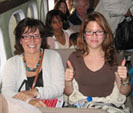 The females in our focus group finally agreed that, on the level of Paris Hilton and Nicole Ritchie in The Simple Life, Margaret and Sophie Trudeau in Ethiopia works. The appearance of Liberal candidate Justin Trudeau’s wife and mother in the CTV show A Window Opens, on Saturday, May 12, at 7 PM (whatever your time zone), was full of everything you might have guessed it would be.
The females in our focus group finally agreed that, on the level of Paris Hilton and Nicole Ritchie in The Simple Life, Margaret and Sophie Trudeau in Ethiopia works. The appearance of Liberal candidate Justin Trudeau’s wife and mother in the CTV show A Window Opens, on Saturday, May 12, at 7 PM (whatever your time zone), was full of everything you might have guessed it would be.
The females in our group did seem to like it quite a bit less than the males. But they also agreed that it was interesting to watch Margaret and Sophie on TV. The bigger question is what did this hour-long extravaganza, on a Saturday night in the spring of 2007, tell us about Canada and Canadian politics, in the Conservative minority age of Prime Minister Stephen Harper – which may or may not last who knows how long? And on this question almost everyone in the focus group finally disagreed.
The Ethiopia excuse …
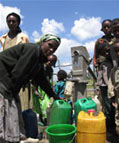 The “Ethiopia” side of the extravaganza can be dispensed with quickly. As the CTV website explains: “Margaret Trudeau, the president of the board of directors of WaterCan, a Canadian charitable organization that builds wells in African villages, brought her daughter-in-law along on a recent journey to Ethiopia … Their trip was documented in a CTV special dubbed A Window Opens: Margaret and Sophie in Ethiopia …”
The “Ethiopia” side of the extravaganza can be dispensed with quickly. As the CTV website explains: “Margaret Trudeau, the president of the board of directors of WaterCan, a Canadian charitable organization that builds wells in African villages, brought her daughter-in-law along on a recent journey to Ethiopia … Their trip was documented in a CTV special dubbed A Window Opens: Margaret and Sophie in Ethiopia …”
In the promotional run-up the day before the show aired, Margaret Trudeau told CTV’s Canada AM: “Not only was it a chance to be with Sophie, which is always a delight to me, but it was a chance to experience something with her that I don’t think she had had the chance to do – to be in the poorest part of the world, seeing what women and children are suffering when they don’t have clean water.”
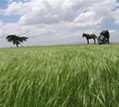 Our counterweights focus group had only two broad thoughts about this side of the program. The first was just that Ethiopia seemed a more geographically interesting and even attractive place than some had thought.
Our counterweights focus group had only two broad thoughts about this side of the program. The first was just that Ethiopia seemed a more geographically interesting and even attractive place than some had thought.
The second was that there is always something unseemly about “first world” rich people visiting “third world” poor people, for purposes of inspecting the charitable donations that the rich have made to the poor. Margaret Trudeau’s theory seems to be that it is important for Canadians, who are generally speaking quite well off in the global village, to understand that others in other parts of the world are still very poor – and lacking even such rudimentary human resources as clean water. (As do some Indian reserves in Canada, but that’s another story.) Many who watch TV these days already understand this, however, from the ordinary news.
The burden of the Trudeau name …
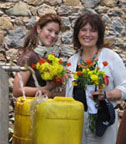 Probably for most Canadians who watched A Window Opens: Margaret and Sophie in Ethiopia, the interactions between Margaret and Sophie, and what we learned from each of them individually, were considerably more interesting than the Ethiopian setting of their adventure.
Probably for most Canadians who watched A Window Opens: Margaret and Sophie in Ethiopia, the interactions between Margaret and Sophie, and what we learned from each of them individually, were considerably more interesting than the Ethiopian setting of their adventure.
Here what especially annoyed some of the more ardent egalitarian democrats in our focus group was the two Ms. Trudeau’s musings on the great responsibilities that come with bearing the Trudeau surname in Canada today. And these responsibilities are only increased, the ladies noted, by the prospect that Justin Trudeau – Margaret’s eldest son and Sophie’s still comparatively new husband (whose first child she is now pregnant with as well) – will one day follow in his famous father Pierre’s footsteps, and become Prime Minister of Canada (the post currently occupied by Stephen Harper, from Calgary by way of Toronto: and for more on this see below).
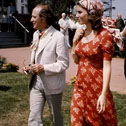 It is easy enough to make fun of all this as the rankest snobbery, especially out of place in today’s democratic and egalitarian Canada – the very kind of country that Pierre Trudeau at least seemed to many voters to be trying to promote. (Canada, as he once wrote, has had “not many dominant leaders. Much more important to our history has been the struggle of nameless Canadians to improve their lives in our often hostile environment.” And this “struggle has produced its share of adventure and heroism.”)
It is easy enough to make fun of all this as the rankest snobbery, especially out of place in today’s democratic and egalitarian Canada – the very kind of country that Pierre Trudeau at least seemed to many voters to be trying to promote. (Canada, as he once wrote, has had “not many dominant leaders. Much more important to our history has been the struggle of nameless Canadians to improve their lives in our often hostile environment.” And this “struggle has produced its share of adventure and heroism.”)
Yet there are two different quick responses to criticism of this sort, and each can seem compelling in its own way. The first is just that, say whatever else you like, family political dynasties have recurrently appeared in the histories of virtually all the world’s modern democracies. And it is not just Margaret and Sophie who think that Justin Trudeau may one day become Prime Minister of Canada. Note, e.g., the nameless Canadian from Quebec who recently wrote in to Le Devoir, just after Justin had won the federal Liberal nomination in the Montreal riding of Papineau. He was protesting the current conventional wisdom that Justin Trudeau has no traction at all nowadays in his father’s native province of Quebec. And he declared: “Moi je prdit que d’ici 10 ans le Qubec sera derrire Justin et il sera le Premier Ministre du Canada en 2020 avec le support massif du Qubec.”
 The second response is that there actually does seem to be a quite deep and authentic sense in which the Trudeau name carries a potent and powerful burden in Canada today. There were, no doubt at all, many things wrong and unwise about Pierre Elliott Trudeau’s conception of the Canadian future. As the Ontario historian Robert Bothwell aptly observed long ago, e.g., Pierre Trudeau “saw Canada from one end of Montreal Island to the other.” And he never quite grasped that it was old-fashioned economic development which would finally mobilize the new global village he in some ways seemed to be prophesying himself – and that this would have important economic development implications for countries like Canada too.
The second response is that there actually does seem to be a quite deep and authentic sense in which the Trudeau name carries a potent and powerful burden in Canada today. There were, no doubt at all, many things wrong and unwise about Pierre Elliott Trudeau’s conception of the Canadian future. As the Ontario historian Robert Bothwell aptly observed long ago, e.g., Pierre Trudeau “saw Canada from one end of Montreal Island to the other.” And he never quite grasped that it was old-fashioned economic development which would finally mobilize the new global village he in some ways seemed to be prophesying himself – and that this would have important economic development implications for countries like Canada too.
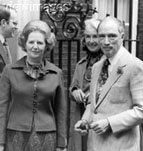 But, say whatever else you like again, Pierre Trudeau was finally the most significant Canadian prime minister in the lives of all Canadians living today – and quite arguably in the entire as yet slender 140-year history of the present Canadian confederation since 1867. His one indisputable soaring achievement was the Constitution Act 1982 – which, in the immediate wake of the first failed Quebec sovereignty referendum in 1980, at long last “patriated” the Constitution of Canada from the United Kingdom, and gave Canadians their own constitutionally entrenched Charter of Rights and Freedoms. On the day the new Act officially took effect – April 17, 1982 – the former federal New Democratic leader Tommy Douglas told the rest of us on television that this was, in traditional Canadian terms, an almost unbelievable achievement, and that no one but Pierre Trudeau could have brought it off. The Constitution Act 1982 has its share of human flaws, and the province of Quebec has still not formally “signed” the document (even though it has made some use of its legal provisions). But Trudeau’s Charter of Rights is the only part of the present written Constitution of Canada that has any serious claim to distinction. And Canada today almost certainly has a much more interesting and secure future than it would have if Pierre Trudeau had not managed to bring the Constitution Act 1982 into the light of day.
But, say whatever else you like again, Pierre Trudeau was finally the most significant Canadian prime minister in the lives of all Canadians living today – and quite arguably in the entire as yet slender 140-year history of the present Canadian confederation since 1867. His one indisputable soaring achievement was the Constitution Act 1982 – which, in the immediate wake of the first failed Quebec sovereignty referendum in 1980, at long last “patriated” the Constitution of Canada from the United Kingdom, and gave Canadians their own constitutionally entrenched Charter of Rights and Freedoms. On the day the new Act officially took effect – April 17, 1982 – the former federal New Democratic leader Tommy Douglas told the rest of us on television that this was, in traditional Canadian terms, an almost unbelievable achievement, and that no one but Pierre Trudeau could have brought it off. The Constitution Act 1982 has its share of human flaws, and the province of Quebec has still not formally “signed” the document (even though it has made some use of its legal provisions). But Trudeau’s Charter of Rights is the only part of the present written Constitution of Canada that has any serious claim to distinction. And Canada today almost certainly has a much more interesting and secure future than it would have if Pierre Trudeau had not managed to bring the Constitution Act 1982 into the light of day.
A footnote on Sophie and Zoe in Paris?
 Many Canadians who were alive during Trudeau’s time as prime minister (19681984, with a very brief Joe Clark Conservative interregnum, from June 1979 to March 1980) do not remember the details of his ultimate constitutional contribution to the Canadian future. But what they do remember – and often even if they never liked Trudeau much and live in Western Canada, e.g. – is that Pierre Trudeau was a smart and steely guy who really did have some fire in his belly about what Canada ought to be. (Even if he was also humanly foolish enough in his private life to marry a girl like Margaret, who was so much younger and less secure, and finally brought him some appalling grief, right in the middle of the most challenging moments of his political career.)
Many Canadians who were alive during Trudeau’s time as prime minister (19681984, with a very brief Joe Clark Conservative interregnum, from June 1979 to March 1980) do not remember the details of his ultimate constitutional contribution to the Canadian future. But what they do remember – and often even if they never liked Trudeau much and live in Western Canada, e.g. – is that Pierre Trudeau was a smart and steely guy who really did have some fire in his belly about what Canada ought to be. (Even if he was also humanly foolish enough in his private life to marry a girl like Margaret, who was so much younger and less secure, and finally brought him some appalling grief, right in the middle of the most challenging moments of his political career.)
Throughout the cross-country constitutional debates of the late 1970s and early 1980s, Trudeau’s resounding question was “Who will speak for Canada?” And who could doubt that he at least quite profoundly believed he had an answer? Of course in the first instance the answer was him, and in some ways he did seem up to the part, even if you did not agree with him about the exact lines – or anything much else. But ultimately his wider and more general answer was a democratically elected Canadian federal government, that in one way or another supported and promoted the individual struggles of “nameless Canadians to improve their lives,” regardless of who they are or where they come from or how long they have been in Canada.
 As you listen to the often quite unexceptional and pedestrian comments of Pierre’s eldest son Justin Trudeau in the spring of 2007, on such matters as the environment or the future of Quebec sovereignty, it is still not easy to see how he is or perhaps will ever be the Canadian man of steel his father was. This may not be important for Justin’s real potential as a future Canadian prime minister. (There have been at best very few other Canadian prime ministers since 1867 who would compare all that well against his father either.) And Justin Trudeau, at least some of we counterweights editors agree, hinted at some degree of refreshing political shrewdness when he backed Gerard Kennedy at this past December’s federal Liberal leadership convention.
As you listen to the often quite unexceptional and pedestrian comments of Pierre’s eldest son Justin Trudeau in the spring of 2007, on such matters as the environment or the future of Quebec sovereignty, it is still not easy to see how he is or perhaps will ever be the Canadian man of steel his father was. This may not be important for Justin’s real potential as a future Canadian prime minister. (There have been at best very few other Canadian prime ministers since 1867 who would compare all that well against his father either.) And Justin Trudeau, at least some of we counterweights editors agree, hinted at some degree of refreshing political shrewdness when he backed Gerard Kennedy at this past December’s federal Liberal leadership convention.
But there are those who say that it is not really Justin who will finally follow in his father’s political footsteps. It is his apparently more hard-edged and intellectually acute younger brother Alexandre, a.k.a. Sacha. And it was interesting that Justin’s wife Sophie herself vaguely alluded to this prospect on A Window Opens: Margaret and Sophie in Ethiopia. It may be that Justin will someday become prime minister, she allowed. Or perhaps it will be Sacha. (Though it is Justin and not Sacha who has just recently won the federal Liberal nomination in Papineau.)
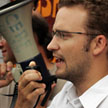 In some ways, this seemed attractively broad-minded of the former Sophie Gregoire, who now apparently calls herself Sophie Gregoire Trudeau, or just Sophie Trudeau, depending on the context. (And who claims to so much like having Margaret as a mother-in-law.) But in other ways it may not be surprising. Sacha or Alexandre himself has recently married Zoe Bedos, who was introduced to him by his sister-in-law Sophie. Alexandre and Zoe have already had their first child, who has been named after his grandfather Pierre. So if it finally is Sacha and not Justin who follows his father into the office of Prime Minister of Canada, “Princess Sophie” (as Margaret told us they call her in the family) will have played a crucial role in his life too.
In some ways, this seemed attractively broad-minded of the former Sophie Gregoire, who now apparently calls herself Sophie Gregoire Trudeau, or just Sophie Trudeau, depending on the context. (And who claims to so much like having Margaret as a mother-in-law.) But in other ways it may not be surprising. Sacha or Alexandre himself has recently married Zoe Bedos, who was introduced to him by his sister-in-law Sophie. Alexandre and Zoe have already had their first child, who has been named after his grandfather Pierre. So if it finally is Sacha and not Justin who follows his father into the office of Prime Minister of Canada, “Princess Sophie” (as Margaret told us they call her in the family) will have played a crucial role in his life too.
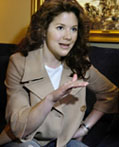 In any case, as a sidebar to the larger story, several in our counterweights focus group on A Window Opens: Margaret and Sophie in Ethiopia finally suggested that CTV should develop a new special, featuring the former Sophie Gregoire and the former Zoe Bedos on some foreign adventure. It was nice enough to see Margaret again – and several of the males in our focus group commented on how much better she looks these days than they were expecting. But the person bearing the burden of the Trudeau name who those Canadians interested in such things really want to see and hear more from now is Sophie’s new sister-in-law, Zoe Bedos. Perhaps it could be a show about how both Trudeau wives go to Paris, to buy new clothes for their babies, etc – and to rediscover how, as the late grandfather Pierre liked to explain to his children, you are more elegant when you speak French.
In any case, as a sidebar to the larger story, several in our counterweights focus group on A Window Opens: Margaret and Sophie in Ethiopia finally suggested that CTV should develop a new special, featuring the former Sophie Gregoire and the former Zoe Bedos on some foreign adventure. It was nice enough to see Margaret again – and several of the males in our focus group commented on how much better she looks these days than they were expecting. But the person bearing the burden of the Trudeau name who those Canadians interested in such things really want to see and hear more from now is Sophie’s new sister-in-law, Zoe Bedos. Perhaps it could be a show about how both Trudeau wives go to Paris, to buy new clothes for their babies, etc – and to rediscover how, as the late grandfather Pierre liked to explain to his children, you are more elegant when you speak French.
Is the real trouble that Stephen Harper has not yet quite digested the legacy of Pierre Trudeau?
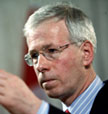 In the end, of course, all this strays a little too far from the subject immediately at hand. What does it all mean for Prime Minister Stephen Harper right now?
In the end, of course, all this strays a little too far from the subject immediately at hand. What does it all mean for Prime Minister Stephen Harper right now?
To start with, as Sophie stressed on A Window Opens: Margaret and Sophie in Ethiopia, if Justin Trudeau ever does become Prime Minister of Canada, with Princess Sophie at his side, it will not happen for a very long time yet. All Stephen Harper has to worry about for the moment is the current leader of the Liberal Party of Canada, Stephane Dion. (And however good, or bad, M. Dion may finally prove to be, he too is certainly no Pierre Trudeau. And no doubt would not want to be.)
 Beyond this, as noted at the top, our counterweights focus group finally disagreed about almost everything, in true Canadian form, eh. But one second thought was that just as Mr. Harper has been having his ups and downs since he became prime minister, a year ago this past February, so did Pierre Trudeau, throughout his quite long term in office, from 1968 to 1984.
Beyond this, as noted at the top, our counterweights focus group finally disagreed about almost everything, in true Canadian form, eh. But one second thought was that just as Mr. Harper has been having his ups and downs since he became prime minister, a year ago this past February, so did Pierre Trudeau, throughout his quite long term in office, from 1968 to 1984.
In a Canadian party system that was complicated enough even back then, Trudeau won his biggest share of the cross-country popular vote – 45.5% – in his first flower-power “Trudeaumania” election of 1968. All he managed his next time out in 1972 was 38.5% and a minority government kept in office by the NDP. He sort of bounced back in  1974, winning a majority of seats in Parliament with 43.2% of the popular vote. Then Joe Clark’s Conservatives won a minority government with only 35.9% of the cross-country popular vote in 1979. And then Trudeau came back in 1980 with 44.3% of the vote, just in time to help defeat the first Quebec sovereignty referendum, and use the resulting unusual Canadian political energy to mastermind the Constitution Act 1982. And still more to the point, perhaps, almost anyone who lived through it all as an ordinary voter will tell you that things in Canada didn’t seem all that great when Trudeau actually was prime minister. He did have his share of flaws from day to day. And it is only in retrospect that the magnitude of his ultimate constitutional achievement becomes so awesomely clear.
1974, winning a majority of seats in Parliament with 43.2% of the popular vote. Then Joe Clark’s Conservatives won a minority government with only 35.9% of the cross-country popular vote in 1979. And then Trudeau came back in 1980 with 44.3% of the vote, just in time to help defeat the first Quebec sovereignty referendum, and use the resulting unusual Canadian political energy to mastermind the Constitution Act 1982. And still more to the point, perhaps, almost anyone who lived through it all as an ordinary voter will tell you that things in Canada didn’t seem all that great when Trudeau actually was prime minister. He did have his share of flaws from day to day. And it is only in retrospect that the magnitude of his ultimate constitutional achievement becomes so awesomely clear.
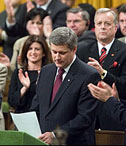 Another quite controversial thought from our focus group was that the greatest potential of Stephen Harper could be to succeed as some kind of English-speaking Canadian answer to Pierre Trudeau. Mr. Harper does have his own constitutional ambitions, it seems clear enough. You can already see them in his plots for “step by step” Senate reform (doomed for the most part, it is now apparent, so long as he has only a minority government), and his cunning and very broadly supported Parliamentary resolution on the “Quebecois nation within a united Canada.” Canada’s Conservative prime minister from 1984 to 1993, Brian Mulroney, tried to tidy up various Canadian constitutional loose ends that Pierre Trudeau left for the future. He finally failed and made himself very unpopular in the process, outside Quebec. But Stephen Harper seems to have learned from all this. And sometimes he even shows signs of a much more clever and cunning constitutional agenda, which pays more shrewd attention to the “eclectic” diversity of the Canadian federation that began in 1867. (And that may even have more in common with at least certain sides of Pierre Trudeau than even Mr. Harper may as yet be prepared to admit?)
Another quite controversial thought from our focus group was that the greatest potential of Stephen Harper could be to succeed as some kind of English-speaking Canadian answer to Pierre Trudeau. Mr. Harper does have his own constitutional ambitions, it seems clear enough. You can already see them in his plots for “step by step” Senate reform (doomed for the most part, it is now apparent, so long as he has only a minority government), and his cunning and very broadly supported Parliamentary resolution on the “Quebecois nation within a united Canada.” Canada’s Conservative prime minister from 1984 to 1993, Brian Mulroney, tried to tidy up various Canadian constitutional loose ends that Pierre Trudeau left for the future. He finally failed and made himself very unpopular in the process, outside Quebec. But Stephen Harper seems to have learned from all this. And sometimes he even shows signs of a much more clever and cunning constitutional agenda, which pays more shrewd attention to the “eclectic” diversity of the Canadian federation that began in 1867. (And that may even have more in common with at least certain sides of Pierre Trudeau than even Mr. Harper may as yet be prepared to admit?)
Yet another very controversial thought was that one of Stephen Harper’s continuing big problems is that he has still not quite digested Pierre Trudeau’s increasingly indisputable enduring contribution to the 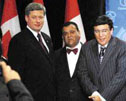 Canadian future. And a Stephen Harper who really wants to win the right to at least a majority of Parliamentary seats, in Canada’s present quite complicated federal political system, must somehow show the cross-country electorate that he really does understand how Trudeau did manage to do some things for the Canadian future that can no longer be undone. That is at least one way of putting Mr. Harper’s continuing problems in the biggest urban centres of Montreal, Toronto, and Vancouver – and in the many other places where various shadows cast by these big urban centres fall (in, e.g., many or some parts of Atlantic Canada and the Prairie Provinces, and much of Ontario, the North, and some parts of Quebec and Canada’s Pacific Coast).
Canadian future. And a Stephen Harper who really wants to win the right to at least a majority of Parliamentary seats, in Canada’s present quite complicated federal political system, must somehow show the cross-country electorate that he really does understand how Trudeau did manage to do some things for the Canadian future that can no longer be undone. That is at least one way of putting Mr. Harper’s continuing problems in the biggest urban centres of Montreal, Toronto, and Vancouver – and in the many other places where various shadows cast by these big urban centres fall (in, e.g., many or some parts of Atlantic Canada and the Prairie Provinces, and much of Ontario, the North, and some parts of Quebec and Canada’s Pacific Coast).
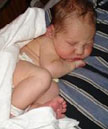 Or so, at any rate, this particular argument goes. Who knows how much sense it really makes? But if it makes any sense at all, it could be that one thing Mr. Harper should do this summer is go on a Pierre-Trudeau-style canoe trip, through some part of the still quite prevalent Canadian northern wilderness. Here he might finally discover what Trudeau called “a feeling for the unique history and geography of this country,” and acquire a fresh “enthusiasm for the tough but satisfying life of the voyageurs,” who first took Canada from coast to coast to coast in the transcontinental and “polyethnic” Indian-European fur trade, back in the 17th and 18th and early 19th centuries, when the bilingual and multicultural Canada of the 21 st century actually began.
Or so, at any rate, this particular argument goes. Who knows how much sense it really makes? But if it makes any sense at all, it could be that one thing Mr. Harper should do this summer is go on a Pierre-Trudeau-style canoe trip, through some part of the still quite prevalent Canadian northern wilderness. Here he might finally discover what Trudeau called “a feeling for the unique history and geography of this country,” and acquire a fresh “enthusiasm for the tough but satisfying life of the voyageurs,” who first took Canada from coast to coast to coast in the transcontinental and “polyethnic” Indian-European fur trade, back in the 17th and 18th and early 19th centuries, when the bilingual and multicultural Canada of the 21 st century actually began.
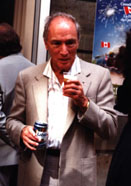 Come to think of it, the present federal Liberal leader Stephane Dion could probably stand a trip of this sort too. Which suggests yet another proposal for a new CTV special – perhaps called something like Stephen and Stephane on the Methye Portage. It may not work quite as well as Paris Hilton and Nicole Ritchie in The Simple Life. But it just might do quite a lot of good for Canada – and especially for the Canada that all those who willingly or otherwise bear the burden of the Trudeau name today also ought to be somehow helping to keep alive, in the midst of many kinds of dangerous times in and around the global village.
Come to think of it, the present federal Liberal leader Stephane Dion could probably stand a trip of this sort too. Which suggests yet another proposal for a new CTV special – perhaps called something like Stephen and Stephane on the Methye Portage. It may not work quite as well as Paris Hilton and Nicole Ritchie in The Simple Life. But it just might do quite a lot of good for Canada – and especially for the Canada that all those who willingly or otherwise bear the burden of the Trudeau name today also ought to be somehow helping to keep alive, in the midst of many kinds of dangerous times in and around the global village.
The direct quotations from Pierre Trudeau’s writings here appear in the short Foreword he wrote for his paddling friend Eric Morse’s book of 1969, Fur Trade Canoe Routes of Canada: Then and Now.
